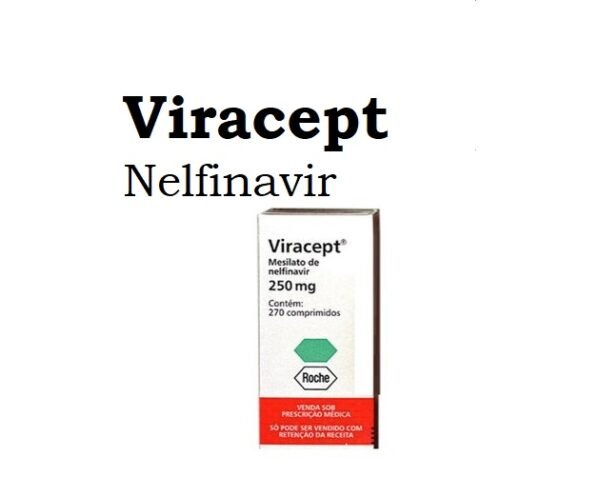Viracept (Nelfinavir) is a protease inhibitor that is used in combination with other antiretroviral drugs for the treatment of HIV-1 infection.
Viracept (Nelfinavir) Uses:
-
HIV-1 infection:
- In the treatment of HIV infection in combination with other antiretroviral therapy.
Nelfinavir (Viracept) for COVID-19 infection:
Nelfinavir is one of the antiviral drugs that has shown efficacy in SARS COV-2 (COVID-19) Coronavirus cell cultures. It was used in combination with the anti-inflammatory drug Cepharanthine. However, efficacy in humans infected with COVID-19 is not established [Ref].
Viracept (nelfinavir) Dose in Adults
Viracept (nelfinavir) Dose in the treatment of HIV-1 infection:
-
P/O:
- 750 milligram 3 times a day or 1250 millgram twice a day with meals in combination with other antiretroviral therapies.
Viracept (nelfinavir) Dose in Children
Nelfinavir (Viracept) dose in the treatment of HIV-1 infection in combination with other antiretroviral agents: Oral:
-
Infants and Children <2 years:
- Usage is not approved.
- A reliable, effective dose has not been established.
- In serum drug concentrations, high interpatient variability occurs.
- In young infants, nelfinavir dosing is problematic, since the drug is best absorbed when taken with a high-fat meal.
-
Children ≥2 years:
Note:
- Pediatric guidelines recommend twice-everyday dosing.
-
Weight-directed dosing:
- 45 to 55 milligram/kilogram/dose (max dose: 1,250 milligram/dose) twice everyday or 25 to 35 milligram/killogram/dose (max dose: 750 mg/dose) 3 times everyday.
- Daily doses >2,500 milligrams/day have not been studied in children.
- Dosage adjustment utilizing a measurement of plasma concentrations and pharmacokinetics may be beneficial, due to the high variability of nelfinavir plasma concentrations in children.
-
Nelfinavir fixed dosing: Oral tablets (250 mg):
-
10 to <13 kilograms:
- 500 milligrams (2 tablets) twice a day or 250 milligrams (1 tablet) three times a day.
-
13 to <19 kilograms:
- 750 milligrams (3 tablets) twice a day or 500 milligrams (2 tablets) three times a day.
-
19 to <21 kilograms:
- 1,000 milligrams (4 tablets) twice a day or 500 milligrams (2 tablets) three times a day.
-
≥21 kilogram:
- 1,000 to 1,250 milligrams (4 to 5 tablets) twice a day or 750 milligrams (3 tablets) three times a day.
-
-
-
Adolescents:
- 1,250 milligrams twice a day or 750 milligrams three times a day.
Note:
- To achieve similar nelfinavir AUCs, some adolescent patients require doses higher than adults.
- Consider the use of serum drug concentrations to guide optimal dosing.
Pregnancy Risk Category: B
- Nelfinavir is a very low to moderately effective transfer agent in the human placenta.
- Data from the antiretroviral pregnancy registry show that there is no increase in overall birth defects after first-trimester exposure.
- Although Maternal antiretroviral Therapy (ART) may increase the risk of preterm birth, information is not available due to variability in maternal factors (disease severity and gestational age at therapy initiation).
- Some studies have shown an increased risk of stillbirth, low birthweight, and infants under gestational age in some cases, but not all.
- Because of the clear benefits to maternal ART, it should not be withheld.
- Long-term monitoring is advised for all infants who have been exposed to antiretroviral medication.
- It is important to evaluate children for mitochondrial dysfunction, especially if they develop severe organ system abnormalities (especially of the CNS and heart).
- Protease inhibitors have been linked to hyperglycemia, diabetes mellitus recurrence, and diabetic ketoacidosis. It isn't clear if this increases with pregnancy.
- The Health and Human Services Perinatal HIV Guidelines do not recommend the use of nelfinavir during pregnancy.
- Females who are pregnant with nelfinavir should switch to a recommended regimen.
- If you are in need, take the two-time daily dose.
- Three times daily is not recommended during pregnancy.
- All pregnant women with HIV should receive ART to lower their viral load and decrease the chance of perinatal transmission.
- Monitoring during pregnancy is more frequent than monitoring in adults who are not pregnant. All females with HIV should continue ART postpartum. It can also be modified after birth.
- Health care providers are encouraged to enroll pregnant females in the Antiretroviral Pregnancy Registry, those who are exposed to antiretroviral medications as early in pregnancy as possible (1-800-2584263 or http://www.APRegistry.com). The National Perinatal HIV Hotline can be contacted at 888-448-8765 (HHS [perinatal] 2018) for a clinical consultation.
Nelfinavir use during breastfeeding:
- Breast milk contains Nelfinavir as well as the active metabolite.
- The Health and Human Services' (HHS) Perinatal HIV Guidelines considers breast milk concentrations to have been low and not significantly.
- Postnatal HIV transmission can still be prevented by infant or maternal antiretroviral treatment. Breastfeeding infants have been found to be multiclass-resistant, even after maternal antiretroviral therapy.
- In the US, where there is a safe and affordable formula and low infant mortality from diarrhea and respiratory infections, it is possible to reduce the transmission of HIV. Females with HIV should therefore avoid breastfeeding.
Viracept Dose in Kidney Disease:
- In the manufacturer’s labeling, there are no dosage adjustments provided (has not been studied).
- However, since <2 percent excreted in urine a dosage reduction would not be expected. Guidelines suggest that no dosage adjustment is necessary.
Viracept Dose in Liver disease:
-
Mild impairment (Child-Pugh class A):
- No dosage adjustment is necessary.
-
Moderate to severe impairment (Child-Pugh class B or C):
- No recommended Use.
Side Effects of Nelfinavir (Viracept):
-
Central Nervous System:
- Anxiety
- Depression
- Dizziness
- Drowsiness
- Emotional Lability
- Headache
- Insomnia
- Malaise
- Migraine
- Myasthenia
- Pain
- Paresthesia
- Seizure
- Sleep Disorder
- Suicidal Ideation
-
Dermatologic:
- Skin Rash
- Dermatitis
- Diaphoresis
- Folliculitis
- Fungal Dermatitis
- Maculopapular Rash
- Pruritus
- Urticaria
-
Endocrine & Metabolic:
- Dehydration
- Hyperglycemia
- Hyperlipidemia
- Hyperuricemia
- Hypoglycemia
- Increased Amylase
- Increased Gammaglutamyl Transferase
- Increased Lactate Dehydrogenase
- Lipodystrophy
- Redistribution Of Body Fat
-
Gastrointestinal:
- Diarrhea
- Nausea
- Flatulence
- Abdominal Pain
- Anorexia
- Dyspepsia
- Epigastric Pain
- Gastrointestinal Hemorrhage
- Oral Mucosa Ulcer
- Pancreatitis
- Vomiting
-
Genitourinary:
- Sexual Disorder
- Urine Abnormality
-
Hematologic & Oncologic:
- Lymphocytopenia
- Decreased Neutrophils
- Anemia
- Leukopenia
- Thrombocytopenia
-
Hepatic:
- Abnormal Hepatic Function Tests
- Hepatitis
- Increased Serum Alkaline Phosphatase
- Increased Serum Transaminases
-
Hypersensitivity:
- Hypersensitivity Reaction
-
Neuromuscular & Skeletal:
- Arthralgia
- Arthritis
- Back Pain
- Hyperkinesia
- Increased Creatine Phosphokinase
- Lipoatrophy
- Lipotrophy
- Muscle Cramps
- Myalgia
- Myopathy
- Weakness
-
Ophthalmic:
- Acute Iritis
- Eye Disease
-
Renal:
- Nephrolithiasis
-
Respiratory:
- Dyspnea
- Pharyngitis
- Rhinitis
- Sinusitis
-
Miscellaneous:
- Fever
Contraindications to Nelfinavir (Viracept):
- Coadministration with drugs that are highly dependent on CYP3A for clearance and for which elevated or reduced plasma concentrations are associated with serious & life-threatening events or lead to reduced efficacy of nelfinavir eg,
- alfuzosin,
- amiodarone,
- cisapride,
- ergot derivatives (eg, dihydroergotamine, ergonovine, ergotamine, methylergonovine),
- oral midazolam,
- lovastatin,
- lurasidone,
- pimozide,
- quinidine,
- rifampin,
- sildenafil (when used for the treatment of pulmonary hypertension),
- simvastatin,
- St John's wort,
- triazolam).
Canadian labeling:
- Clinically significant hypersensitivity to nelfinavir or any component of the formulation
- Coadministration with midazolam (regardless of dosage form)
Warnings and Precautions
-
Diarrhea:
- Use of alcohol is a common cause of diarrhea, especially among children.
- Secretory diarrhea may be mediated via a calcium-dependent process.
- Calcium carbonate was administered in the same time as nelfinavir to treat the adverse effect in adults, without affecting plasma levels of nelfinavir and its major metabolite.
-
Fat redistribution
- Redistribution of fat may occur (eg, buffalo Hump, peripheral wasting with an increased abdominal girth and cushingoid appearance).
-
Immune reconstitution syndrome:
- Patients may develop an immune reconstitution syndrome later in treatment if they have an inflammatory reaction to an indolent, residual opportunistic HIV infection or activate autoimmune disorders.
- Additional evaluation and treatment may still be necessary.
-
Diabetes:
- Patients who have received protease inhibitors have reported changes in glucose tolerance, hyperglycemia and exacerbation or new-onset diabetes mellitus.
-
Hemophilia A and B:
- Patients with hemophilia A and B should be cautious.
- Increased bleeding during protease inhibitor therapy has been reported.
-
Hepatic impairment
- Can cause hepatitis and exacerbate preexisting dysfunction.
- Patients with cirrhosis or hepatitis B, C or other underlying liver disease should be cautious.
- Use is not recommended for those with moderate-to-severe impairments.
Monitoring parameters:
- Liver function tests,
- viral load,
- CD4 count,
- triglycerides,
- cholesterol,
- blood glucose,
- CBC with differential
How to administer Nelfinavir (Viracept)?
-
Tablets:
- Administer with a meal. May dissolve tablets in a small amount of water are unable to swallow tablets.
- Immediately, mix cloudy liquid well and consume. To ensure receiving a full dose, rinse the glass with water, and administer rinse.
- The tablets may be crushed and mixed with a small amount of food alternatively.
- Immediately, entire contents should be consumed. As combination may result in a bitter taste, avoid blending with acidic foods or juices (Viracept Canadian product monograph 2016).
Mechanism of action of Nelfinavir (Viracept):
- It binds to the HIV-1 protease site and inhibits cleavage viral GagPol polyprotein precursors into functional proteins necessary for HIV infection.
- This causes the formation of non-infectious and immature viral particles.
Absorption:
- AUC is two to three times higher in fed conditions than fasting.
- AUC can be high in pediatric patients due to increased clearance. This can lead to problems with compliance and inconsistent food intake when dosing.
Protein binding: greater than 98 percent
Metabolism:
- Hepatic via CYP2C19 & 3A4.
- Major metabolite has activity comparable to the parent drug
Bioavailability:
- 20 percent to 80 percent.
-
Note:
- In HIV-infected patients receiving multiple doses of 1,250 milligrams twice a day (under fed conditions), the 625 milligram and 250-milligram tablet formulations were shown to be bioequivalent. In healthy volunteers, the 250 milligram and 625-milligram tablets were not bioequivalent.
- The AUC for the 625-milligram tablets was 34 percent higher than the 250-milligram tablets in fasted adults and 24 percent higher than the 250-milligram tablets under fed conditions.
Half-life elimination:
- 3.5-5 hours
Time to peak serum concentrations:
- 2-4 hours
Excretion:
- Feces (98 percent to 99 percent, 78 percent as metabolites, 22 percent as unchanged drug);
- urine (1 percent to 2 percent)
International Brands of Nelfinavir:
- Viracept
- Avifix
- Elfivir
- Nelidel
- Nelvir
- Nemacina
Nelfinavir Brand Names in Pakistan:
Nelfinavir 250 mg Tablets |
|
| Finavir | Hilton Pharma (Pvt) Limited |
| Nelvir | A. J. Mirza Pharma (Pvt) Ltd |


 Injection for familial chylomicronemia syndrome.jpeg)

